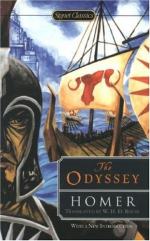To whom with thought mature the king replies:
“The tongue speaks wisely, when the soul is
wise:
Such was thy father! in imperial state,
Great without vice, that oft attends the great;
Nor from the sire art thou, the son, declin’d;
Then hear my words, and grace them in thy mind!
Of all that breathes, or grovelling creeps on earth,
Most man in vain! calamitous by birth:
To-day, with power elate, in strength he blooms;
The haughty creature on that power presumes:
Anon from Heaven a sad reverse he feels:
Untaught to bear, ’gainst Heaven the wretch
rebels.
For man is changeful, as his bliss or woe!
Too high when prosperous, when distress’d too
low.
There was a day, when with the scornful great
I swell’d in pomp and arrogance of state;
Proud of the power that to high birth belongs;
And used that power to justify my wrongs.
Then let not man be proud; but firm of mind,
Bear the best humbly; and the worst resign’d;
Be dumb when Heaven afflicts! unlike yon train
Of haughty spoilers, insolently vain;
Who make their queen and all her wealth a prey:
But vengeance and Ulysses wing their way.
O may’st thou, favour’d by some guardian
power,
Far, far be distant in that deathful hour!
For sure I am, if stern Ulysses breathe,
These lawless riots end in blood and death.”
Then to the gods the rosy juice he pours,
And the drain’d goblet to the chief restores.
Stung to the soul, o’ercast with holy dread,
He shook the graceful honours of his head;
His boding mind the future woe forestalls,
In vain! by great Telemachus he falls,
For Pallas seals his doom: all sad he turns
To join the peers; resumes his throne, and mourns.
Meanwhile Minerva with instinctive fires
Thy soul, Penelope, from Heaven inspires;
With flattering hopes the suitors to betray,
And seem to meet, yet fly, the bridal day:
Thy husband’s wonder, and thy son’s to
raise;
And crown the mother and the wife with praise.
Then, while the streaming sorrow dims her eyes,
Thus, with a transient smile, the matron cries:
“Eurynome! to go where riot reigns
I feel an impulse, though my soul disdains;
To my loved son the snares of death to show,
And in the traitor friend, unmask the foe;
Who, smooth of tongue, in purpose insincere,
Hides fraud in smiles, while death is ambush’d
there.”
“Go, warn thy son, nor be the warning vain
(Replied the sagest of the royal train);
But bathed, anointed, and adorn’d, descend;
Powerful of charms, bid every grace attend;
The tide of flowing tears awhile suppress;
Tears but indulge the sorrow, not repress.
Some joy remains: to thee a son is given,
Such as, in fondness, parents ask of Heaven.”
“Ah me! forbear!” returns the queen, “forbear,
Oh! talk not, talk not of vain beauty’s care;
No more I bathe, since he no longer sees
Those charms, for whom alone I wish to please.
The day that bore Ulysses from this coast
Blasted the little bloom these cheeks could boast.
But instant bid Autonoe descend,
Instant Hippodame our steps attend;
Ill suits it female virtue, to be seen
Alone, indecent, in the walks of men.”




